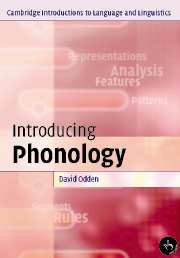Book contents
- Frontmatter
- Contents
- About this book
- Acknowledgments
- A note on languages
- List of abbreviations
- 1 What is phonology?
- 2 Phonetic transcriptions
- 3 Allophonic relations
- 4 Underlying representations
- 5 Interacting processes
- 6 Feature theory
- 7 Doing an analysis
- 8 Phonological typology and naturalness
- 9 Abstractness and psychological reality
- 10 Nonlinear representations
- Glossary
- References
- Index of languages
- General Index
1 - What is phonology?
Published online by Cambridge University Press: 05 June 2012
- Frontmatter
- Contents
- About this book
- Acknowledgments
- A note on languages
- List of abbreviations
- 1 What is phonology?
- 2 Phonetic transcriptions
- 3 Allophonic relations
- 4 Underlying representations
- 5 Interacting processes
- 6 Feature theory
- 7 Doing an analysis
- 8 Phonological typology and naturalness
- 9 Abstractness and psychological reality
- 10 Nonlinear representations
- Glossary
- References
- Index of languages
- General Index
Summary
KEY TERMS
sound
symbol
transcription
grammar
continuous nature of speech
accuracy
PREVIEW
This chapter introduces phonology, the study of the sound systems of language. Its key objective is to:
introduce the notion of phonological rule
explain the nature of sound as a physical phenomenon
highlight the tradeoff between accuracy and usefulness in representing sound
distinguish between phonetics and phonology
contrast the continuous and discrete aspects of linguistic sounds
introduce the notion of “sound as cognitive symbol”
Phonology is one of the core fields that composes the discipline of linguistics, which is defined as the scientific study of language structure. One way to understand what the subject matter of phonology is, is to contrast it with other fields within linguistics. A very brief explanation is that phonology is the study of sound structure in language, which is different from the study of sentence structure (syntax) or word structure (morphology), or how languages change over time (historical linguistics). This definition is very simple, and also inadequate. An important feature of the structure of a sentence is how it is pronounced – its sound structure. The pronunciation of a given word is also a fundamental part of the structure of the word. And certainly the principles of pronunciation in a language are subject to change over time. So the study of phonology eventually touches on other domains of linguistics.
- Type
- Chapter
- Information
- Introducing Phonology , pp. 1 - 18Publisher: Cambridge University PressPrint publication year: 2005

